You’ll typically need about R37,000–R41,000 per month for a family of four (≈US$2,000) and around R11,000–R12,000 if you’re single, excluding rent, with rent by far the biggest cost. Johannesburg and Cape Town trend higher, Pretoria and Durban are cheaper; utilities run R1,000–R3,000 and internet about R600–R900 monthly (entry-level plans can start near ~R600). Groceries per person sit near R2,000–R4,000, and transport is modest if you use public options — keep going and you’ll get practical city-by-city saving tips.
What Is the Average Monthly Cost of Living in South Africa?
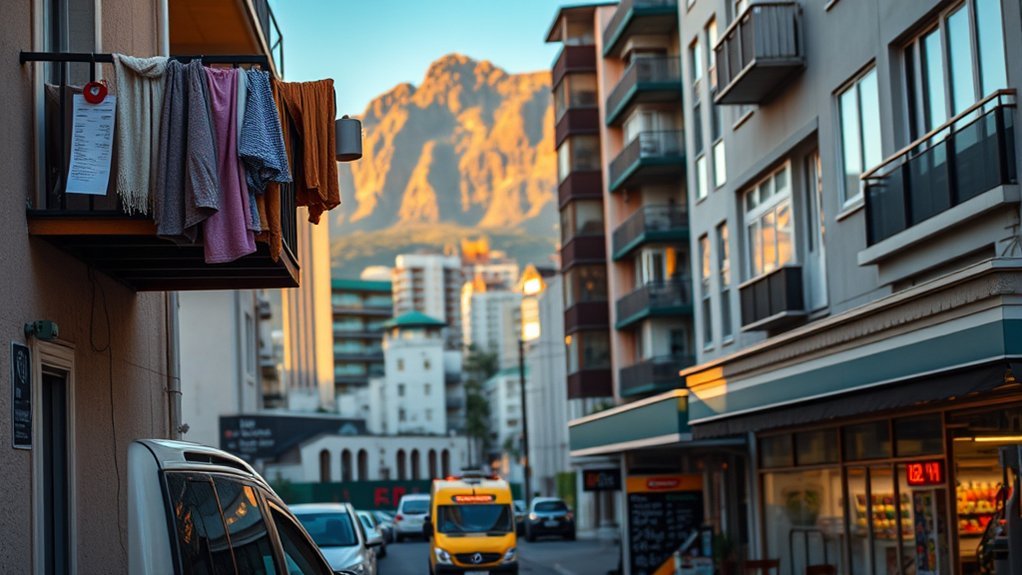
On average, a family of four in South Africa spends about R37,303 (≈US$1,964) per month excluding rent, though costs vary notably by city—Johannesburg averages roughly R41,317 (≈US$2,168) while Cape Town is around R38,128 (≈US$2,001). (USD conversions use ~R17–R19 per US$ and will vary.) You’ll use these benchmarks to compare your situation against the average monthly salary and real living expenses. For a family of four, rent in South Africa is the biggest line item—three-bedroom apartments range roughly R11,650–R25,129—so adjust budgets accordingly. A single person faces lower totals: around R11,879 in Johannesburg and R10,877 in Cape Town, excluding rent, which highlights scale benefits and trade-offs. Transportation costs take about 10–16% of monthly expenses; one-way fares can vary by city and mode (often ~R14–R20 on some routes), with monthly passes roughly R500–R1,500. Use this data-driven view to reallocate spending, demand fair wages, or seek locations that match your goals. Practical comparisons help you turn cost of living figures into actionable choices for greater financial freedom.
City-by-City Breakdown: Johannesburg, Cape Town, Pretoria and Durban
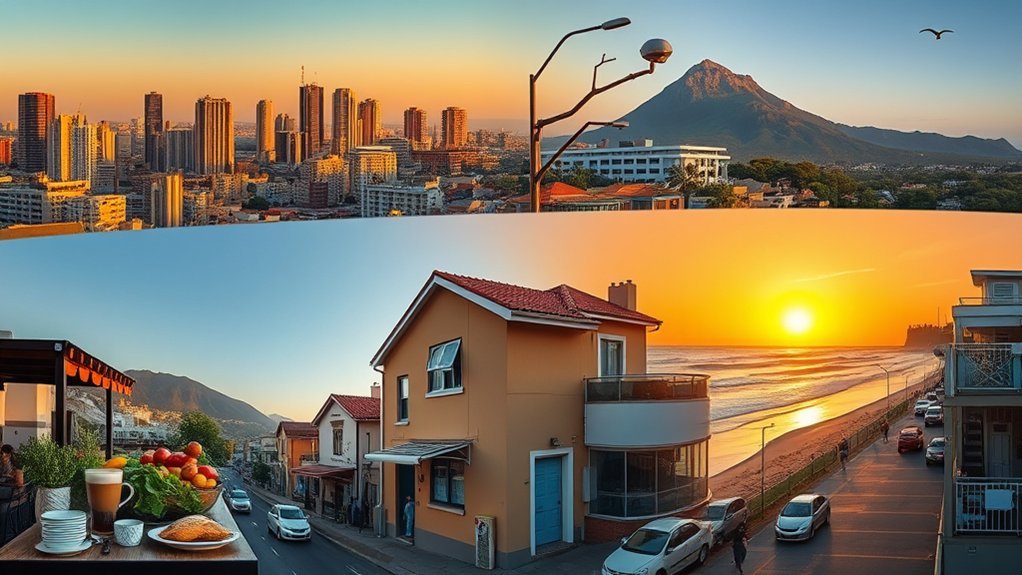
Although costs vary by neighbourhood and lifestyle, you can use clear city-by-city figures to compare where your money will stretch furthest: Johannesburg shows a family of four‘s monthly expenses at R41,317 (excluding rent) (USD$2,167.92) with three-bedroom rent R11,565–R13,369. Cape Town, the priciest, lists family monthly expenses R38,128 (excluding rent) (USD$2,000.62) and three-bedroom rent R15,922–R25,129. Pretoria and Durban sit lower, offering more breathing room.
Compare city-by-city costs: Johannesburg and Cape Town lead expenses, while Pretoria and Durban offer more affordable living options.
- Johannesburg — Cost of Living Comparison: family R41,317 (excluding rent); single person’s estimated monthly cost R11,879 (excluding rent); rent R11,565–R13,369.
- Cape Town — family R38,128 (excluding rent); single R10,877 (excluding rent); rent R15,922–R25,129.
- Pretoria/Durban — Pretoria family R37,312 (excluding rent); single R10,770 (excluding rent); rent R11,650–R12,316. Durban family R35,036 (excluding rent); single R10,422 (excluding rent); rent R11,000–R11,944.
Use these comparative monthly expenses to decide which city best advances your financial freedom.
Housing, Utilities and Internet Expenses

You’ll find one-bedroom rent typically sits between R5,000–R10,000 (US$330–$660), while three-bedroom units in Cape Town can reach roughly R15,922–R25,129 (US$835–$1,319). Expect monthly utilities (electricity, water, heating) of about R1,000–R3,000 (US$66–$200) and internet often R700–R900 per month (entry-level packages from ~R600). Overall, housing costs run about 70–75% lower than in the U.S., so you can quantify clear savings when comparing rent, utilities, and bundle options.
Rent Price Ranges
One-bedroom city-center rents typically run from about R6,079 to R12,054 (US$319–$632) depending on the city, with Cape Town at the high end, while three-bedroom units in major metros like Durban and Cape Town range roughly R11,000–R25,129 (US$577–$1,319). You’ll find rent price ranges reflect clear differences between metropolitan cities and smaller centers; the average rent for a one-bedroom apartment skews higher in coastal hubs. Use this to plan living costs and assert financial freedom — housing costs here are substantially lower than in the UK or USA. Practical comparisons help you choose where to settle based on budget and lifestyle.
- Compare metropolitan cities for price and access.
- Prioritize value over prestige.
- Factor in average rent trends.
Utility Average Costs
Because utilities and connectivity make up a predictable portion of your monthly housing cost, plan on roughly R1,333 (about US$70) for electricity, water and heating plus around R600–R900 for internet in many cities — though prices vary by provider and location. You’ll use these utility average costs to budget realistic living in South Africa expenses alongside rent. In Johannesburg, three-bedroom rent sits around R11,565–R13,370, and one-bedroom city-center units run R6,079–R7,324, so utilities remain a smaller, stable share of total monthly outflow. Compared internationally, utility and internet costs are affordable; rent can be roughly 65–75% lower than the UK and USA. Track usage, compare providers, and prioritize efficient appliances to lower costs.
Internet and Bundles
Several cities in South Africa show average internet bills often in the R700–R900 range per month, with entry-level packages from ~R600, but bundles and speeds push that number up or down depending on your needs. You’ll weigh internet packages by speed and data allowances, balancing freedom to stream or work remotely against monthly costs. Compare that R700–R900 to utilities (≈R1,333) and rent: three-bedroom units range R8,500–R25,000, so your total housing, utilities, and internet picture shifts by city.
- Choose value: cheaper rent lowers overall monthly costs even if internet packages are pricier.
- Prioritize speed: larger packages cost more but empower work and creativity.
- Bundle smart: combined packages can reduce utilities and internet spend.
Use the data to claim financial autonomy.
Food, Groceries and Dining Out
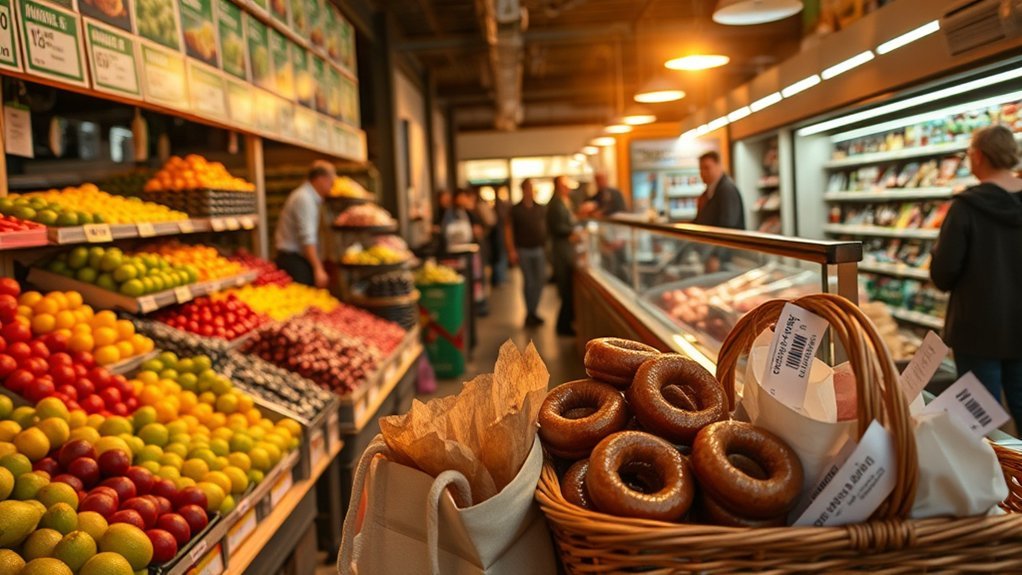
You can expect a monthly grocery budget of about R2,000–R3,000 (US$130–$200) per person, well below typical U.S. costs. Eating out is also cheaper — casual meals run around R120 (US$8) and a three-course mid-range dinner for two averages R500 (US$33), with Cape Town prices roughly 62–65% lower than in the U.S. — and using supermarket loyalty programs and local markets for staples like bread (R17) and a dozen eggs (R40) will stretch your food budget further.
Grocery Budget per Person
Food budgeting in South Africa is surprisingly economical: expect to spend about R2,000–R4,000 (US$105–$210) per month per person depending on whether you cook most meals or dine out occasionally. You’ll plan a grocery budget using local price points—loaf of bread ~R17, dozen eggs ~R36—and adjust for dietary preferences and shopping habits. This keeps food costs transparent and liberating.
- Cook-more scenario: monthly food budget nearer R2,000 if you shop loyalty programs and buy staples at the grocery store.
- Mixed routine: R2,500–R3,000 with occasional dining out and varied diet.
- Higher-cost diet: R3,500–R4,000 if you choose premium items frequently.
Use these figures to compare living costs and reclaim financial freedom.
Eating Out Costs
Eating out in South Africa is noticeably cheaper than in the U.S., with an inexpensive meal costing around ZAR 120 (≈US$8) versus about US$15 in the U.S., and a three-course dinner for two averaging ZAR 500 (≈US$33) compared with roughly US$60 back home. You’ll find dining out at inexpensive restaurants and mid-range spots boosts your freedom: you can eat well without inflating your monthly food budget. Grocery prices (loaf ZAR 17, eggs ZAR 36) keep staples affordable, and internet costs (ZAR 600–1,000) don’t negate savings. Below is a concise comparison.
| Item | South Africa (ZAR) | US Equivalent (USD) |
|---|---|---|
| Inexpensive restaurant | 120 | 15 |
| Three-course meal (2) | 500 | 60 |
| Monthly food budget | 2,000–3,000 | 300–500 |
Local Market Tips
Having covered how dining out compares cost-wise, let’s look at practical local-market tips to stretch that ZAR 2,000–3,000 monthly food budget (US$130–$200) without sacrificing variety. You’re choosing a lower-cost location and can leverage local prices: the average cost of a loaf of bread is about ZAR 17, and inexpensive dining out runs near ZAR 120. Use grocery store loyalty programs and compare average cost per kilogram to optimize spend.
- Shop seasonal produce at markets — cheaper than supermarkets and fresher, cutting your monthly food budget while boosting nutrition.
- Batch-cook staples (grains, beans) — reduces per-meal cost versus dining out.
- Combine occasional dining out with home-cooked meals to enjoy variety and freedom.
Transportation, Healthcare and Education Costs
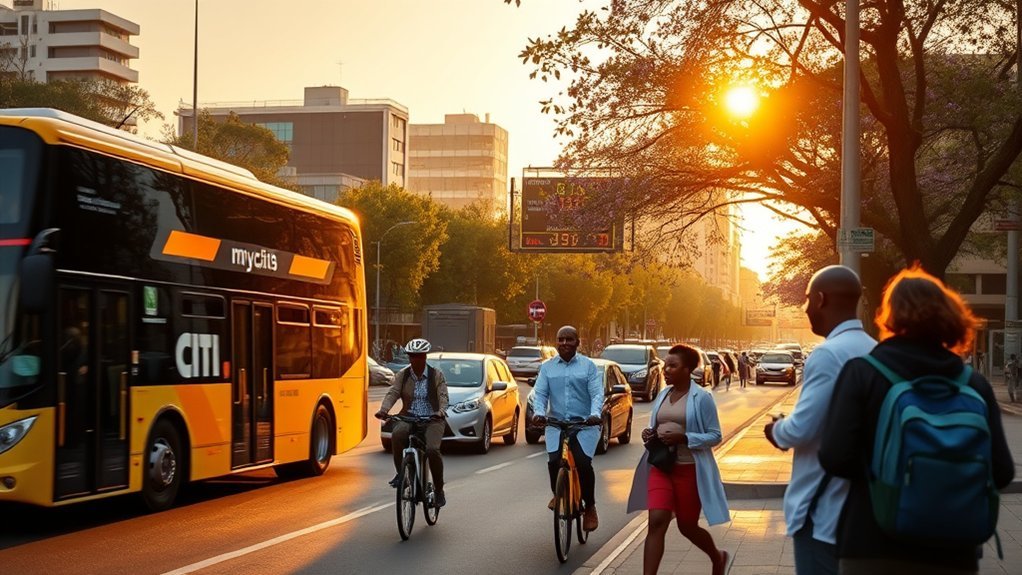
While your daily commute can be very affordable—one-way fare in Cape Town is about R20 (US$1.05) and monthly passes run roughly R500–R1,500 (US$33–$80)—you’ll need to budget more for private services: transportation advantages are clear — public transportation keeps daily costs low, but private options and healthcare raise monthly outlays. You’ll pay about R1,000–R3,000 (US$66–$200) monthly for private healthcare insurance, still cheaper than many Western alternatives, so compare plans for coverage and network access. Education costs vary: some public schools are no-fee, while many fee-paying public schools set annual fees that can start around R8,000–R20,000+; private schools charge R30,000–R70,000+. University tuition fees are commonly ~R50,000–R110,000+ per year depending on institution and program, making higher education comparatively accessible. Use this data to prioritize spending; lean on affordable public transportation and weigh private healthcare and schooling choices against your goals for autonomy and long-term mobility.
Practical Ways to Reduce Your Monthly Expenses
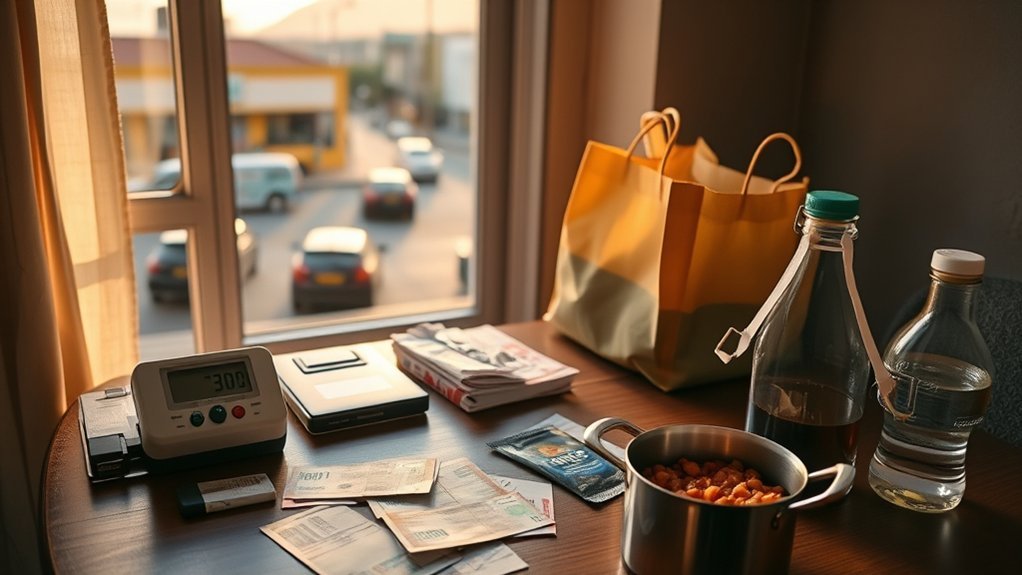
If you want to cut monthly costs quickly, prioritize public transport, local shopping and shared housing — a monthly transit pass (R500–R1,000) often costs less than a few weeks of fuel and maintenance for a car, groceries from local brands can trim a R2,000–R4,000 food bill, and splitting rent in a larger unit can turn a R25,000 single-apartment payment in Cape Town into R8,000–R12,000 per person in Pretoria-range affordability. You’ll lower Monthly Cost of Living by targeting transportation costs, housing and groceries. Balance savings with access to public healthcare and a reasonable monthly fitness club fee or community alternative.
- Prioritize transit and shared accommodation: use public transport, rent three-bedroom affordable housing with roommates to cut per-person rent drastically.
- Shop locally and use loyalty programs: choose local brands for food in South Africa, track discounts to shave R hundreds monthly.
- Reassess subscriptions: swap costly gyms for outdoor or community options; redirect savings to emergency funds and liberation-focused goals.
Frequently Asked Questions
How Much Money Do You Need to Live Comfortably in South Africa?
Depending on city and whether rent is included, you’ll need about ~R12,000 monthly solo and ~R38,000–R41,000 for a family of four, excluding rent; add rent on top (which varies widely by neighbourhood and housing type). Compare cost of living to average salary, factor food expenses, transportation costs, healthcare prices, education fees, utility bills, entertainment budget, and lifestyle choices.
Can I Live in South Africa as a US Citizen?
Yes — you can live in South Africa: meet visa requirements, tap expat communities, compare cost of groceries, job opportunities, healthcare options, cultural differences, language barriers, safety concerns, transportation methods, and plan practically for liberation.
How Much Is Rent in South Africa in US Dollars?
You’ll pay roughly US$318–$660 for one-bedroom and US$577–$1,319 for three-bedroom units; Cape Town apartments cost more, Johannesburg rentals midrange, Durban housing cheaper, Pretoria costs moderate, Port Elizabeth prices lower — compare urban vs rural lease agreements, expat experiences.
Is It Cheaper to Live in South Africa or the United States?
You’ll find South Africa cheaper, like sunshine easing winter — cost comparison shows lower living expenses: housing market, grocery prices, transportation fees and healthcare costs beat the U.S., though currency exchange, job opportunities and quality of life vary.
Conclusion
Living in South Africa largely depends on location — Cape Town and Johannesburg cost more than Pretoria or Durban — but you can cut costs with smart choices. By comparing rental ranges, utility outlays, grocery gaps and transport trade-offs, you’ll spot savings: smaller suburbs, shared housing, local markets, and public transit. Practical planning produces predictable monthly spending, preventing surprises. Prioritize priorities, pick practical perks, and persistently pursue price-conscious practices to protect your pocket.


